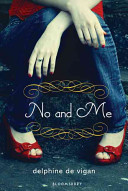
No and Me
Written by Delphine de ViganBloomsbury USA, 2010, pp. 256
ISBN: 978-1599904795
Sometimes I leave her there, in front of an empty beer glass. I get up, sit down again, hang around, try to find something to comfort her. I can’t find the words. I don’t manage to go. She looks down and says nothing. And our silence is filled with the world’s impotence. (p. 51)
Thirteen-year-old Lou is bright. Bright, but shy, however, and that shyness creates opportunities for her Parisian classmates to delight in any attention given her. So, when challenged to make a presentation at school, Lou decides to say the first thing that comes into her head, which is to present the story of a homeless girl based on interviews of an actual homeless teen. The problem is that Lou does not know any homeless people, much less a homeless girl, and she is warned about approaching someone “unsuitable” that she might see on the street. Nevertheless, Lou decides to search for a homeless girl at the Austerlitz train station, and when she is approached by an older girl who wants a cigarette, she sees her opportunity. From this auspicious beginning, the two embark upon a journey of discovery that leads to friendship and the challenges of surviving in a world without support. No and Me ventures into the issues of homeless teens, their survival, and the resources they need to become the people they would like to become. The road is difficult—for those who are homeless and for those who may wish to befriend them. Lou and No are realistic characters, which makes reading this novel both difficult and engaging. It is an excellent text to use with young adults as the narrative really puts a face on the homeless population—a face very similar to the readers’ own.
No and Me presents one of the most difficult realities faced by developed nations—what do we do with those who are abandoned or who have no resources to keep them from living on the streets? It is a question about national morality and ethics as well as the morality of the communities and individuals within a nation. This novel could be read alongside Make Lemonade (Virginia Euwer Wolff, 2006) and How I Made it to 18 (Tracy White, 2010) in a unit on young adults attempting to survive with limited resources. If added to a unit on homelessness, texts like A Small Kiss Free Kiss in the Dark (Glenda Millard, 2011) and Homelessness Comes to School (Joseph Murphy & KerriTobin, 2011) would be nice complements.
No and Me addresses themes about the weight of being alone in the world, the crucial element of family and friends, and the importance of economic and emotional support. It is a stark reminder that life really is fragile and reminds us that our assumptions about life in developed nations are more myth than reality. The novel is bittersweet, bringing readers to reality that sometimes our help isn’t enough. The story widens readers’ understandings of homelessness as well as the hope that there are ways to support those who need it. Delphine de Vigan won the 2008 Prix de Libraries award for No and Me, her third novel. She lives in Paris and is interviewed in French on youtube.com at http://www.youtube.com/watch?v=TXsiy5xNa74. The book was made into a movie in 2010.
Holly Johnson, University of Cincinnati, Cincinnati, OH
WOW Review, Volume IV, Issue 1 by Worlds of Words is licensed under a Creative Commons Attribution-NonCommercial-ShareAlike 4.0 International License. Based on work at https://wowlit.org/on-line-publications/review/iv-1/

Hello,
How I wish I had found this posting before I submitted my changes for the paperback version of Karma! As you can imagine it is not easy to write of Indian culture as a foreigner. All assurances to readers that I did enlist the help of three Indo-Canadian writers for assistance with the language (one writer of HIndu descent and two Sikh-Punjabi writers). Not only did they read for accuracy but also made many of the additions that you refer to as incorrect. Sigh. It is so difficult to get things right. Writing Karma was a very risky undertaking that I spent three years on. To explore both a culture and the dire political situation of 1984 as an outsider was fraught with peril but I was committed to telling this important story. My hope was to bring to light the relatively unknown massacre of the Sikhs to the general community as well as write about the difficulties of immigration, identity and adolescence. It was a work of passion that I am proud of. Many thanks for taking the time to read Karma and offer your thoughts. I learned much for your post. All my best, Cathy Ostlere
Hello Cathy,
Thank you for your gracious response! I thoroughly enjoyed reading the novel and was stunned at the meticulous descriptions of daily life in India, especially considering that your first visit to India was not exactly very pleasurable. India is complex and it is very challenging to view it as a single entity or a single theoretical construct. I admire and applaud your resolve to write a novel about my homeland despite the challenges of being an outsider. And I also applaud your thematic choice for the main plot – the riots following Mrs. Gandhi’s assassination are some of the least known and least discussed topics of Indian politics. I hope you will be writing another such powerful story set in India pretty soon! Warmest regards, Shri Ramakrishnan